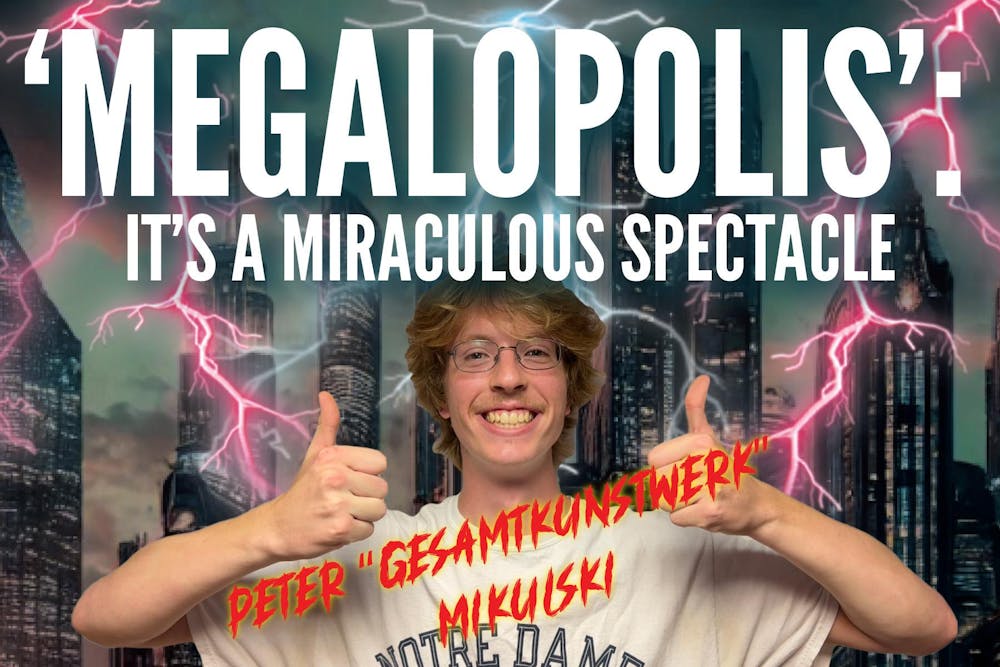Ostensibly, “art film” is for exploring all the cinematic possibilities that blockbuster audiences won’t put up with. In reality, however, “art film” has become a whitewashed sepulcher — it’s all about realistic depictions of mental illness, unpacking generational trauma and not much else. Its virtue used to be its breadth, but recently, it’s hemmed itself in.
That’s why I loved “Megalopolis”: its sheer scope. While I can’t deny its rough edges and loose threads, I can’t deny the way it made me feel either. I sat on the edge of my seat in awe of the spectacle and pageantry playing out before me, thinking “Is that allowed?” and “I never would’ve expected that” and “I didn’t realize that was possible!”
Director Francis Ford Coppola frames his movie with title cards in Roman capitals etched on marble and a narrator — the sultry-voiced Laurence Fishburne (who sounds exactly like Ron Perlman, who narrated “Fallout: New Vegas”). One of these title cards declares that “Megalopolis” is a fable. This detail has proven a stumbling block for critics, who take it to mean that the movie should be read allegorically and then hunt for one-to-one correlations between its plot and the news. Is Shia LaBeouf’s character (named Clodio Pulcher) supposed to be Donald Trump? Who, then, is Hamilton Crassus (played by Jon Voight) — a symbol of old money elitism, perhaps? If Giancarlo Esposito’s Mayor Cicero is supposed to represent a well-meaning establishment liberal, does that make Adam Driver’s Cesar Catalina a figure of Trumpian right-wing populism? None of these analyses quite fit, so the critics blame the movie and call it unclear. Maybe the problem isn’t the movie itself but instead this stilted way of reading it.
Coppola’s “fable” is less like “Animal Farm” — which invites you to declare “This pig is Trotsky and this pig is Stalin” — and more like a legend, set ambiguously in the future and placed in a semi-recognizable world. He’s not literalistically moralizing about current events but wrestling with images. The audience is supposed to recognize something of Donald Trump in a character, something of fascism in a set, something of 9/11 in a plot point, something of New York in the setting, but “Megalopolis” has higher aims than simply retelling the evening news while disguising it in an allegory.
Its detractors, who think the movie is a puzzle to be solved or a test question to be answered, can’t see what’s good about “Megalopolis.” Busy trying to find a Marvel Cinematic Universe-type explanation of what “Megalon” is and preoccupied with leveling CinemaSins-level critiques of the time travel plotline, they ignore the moments of pure visual spectacle and genuine interpersonal hilarity.
I’ll concede that “Megalopolis” isn’t Coppola’s best plot work, but the acting direction is incredible. As sharp as always, Coppola can characterize a group of people and their world with just a handful of words and images — I was particularly entertained by the Pulcher sisters. He also gives Aubrey Plaza room to breathe as a comic and dramatic actress, which she is so often refused, and as a result, he gets a performance out of her that’s great, big and refreshing. Adam Driver is well-suited for his mysterious leading man role, equal parts Kylo Ren and Adam from “Girls.” Esposito’s voice is perfect for Cicero, orator maximus. LaBeouf and Voight make a meal out of their depraved plutocrats schtick. Grace VanderWaal’s popstar character and her musical interlude are a nice touch. Maybe he could’ve gotten more mileage out of Dustin Hoffman and Jason Schwartzman, but the movie is so jam-packed as it is that I don’t know where he might’ve fit them.
Pauline Kael — the sort of critic whom I try to be — loved Coppola’s “The Godfather.” She wrote, “If ever there was a great example of how the best popular movies come out of a merger of commerce and art, ‘The Godfather’ is it.” While she would have hated “Megalopolis” and all its extraneous thrills, she insisted that criticism must start with a gut feeling and follow from there. As I watched “Megalopolis,” my jaw agape with shock and awe, I felt in my gut that it was great. I think if you watch it with an open mind, resist the urge to pick it apart and let its glitz and glam wash over you, you’ll feel that way too.










